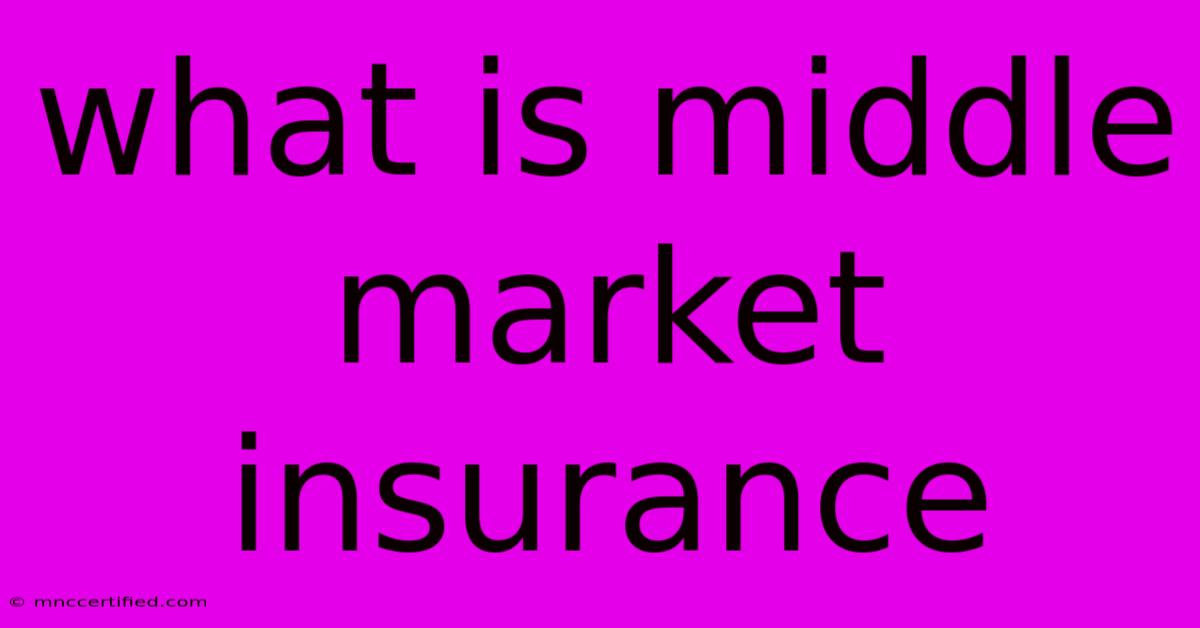What Is Middle Market Insurance

Table of Contents
What is Middle Market Insurance? A Comprehensive Guide
Middle market insurance is a specialized area of the insurance industry focusing on the unique needs of businesses classified as "middle market." But what exactly is the middle market? It generally refers to companies too large for small business insurance programs but not quite substantial enough to qualify for the large corporate insurance solutions typically offered by global insurers. This typically translates to companies with annual revenues between $20 million and $1 billion, although this range can vary depending on the insurer and specific industry.
Understanding the Middle Market Business Landscape
The middle market comprises a diverse range of businesses, including:
- Manufacturing: Companies producing goods, often requiring specialized liability and property insurance.
- Distribution and Wholesale: Businesses responsible for getting products to retailers, needing robust transportation and logistics coverage.
- Retail: Businesses selling goods directly to consumers, facing risks related to inventory, customer liability, and property damage.
- Technology: Rapidly growing companies in software, IT services, and other technology sectors, often requiring coverage for cyber risks and intellectual property.
- Healthcare: Clinics, physician groups, and other healthcare providers needing specialized medical malpractice and professional liability insurance.
These businesses share some common characteristics:
- Complex Risk Profiles: They often have more intricate operations and risk exposures than smaller companies.
- Sophisticated Insurance Needs: Their needs go beyond basic general liability and property insurance, requiring tailored coverage solutions.
- Strategic Risk Management: Middle market companies often employ dedicated risk management professionals.
- Negotiating Power: Their size gives them more leverage to negotiate favorable insurance terms and pricing.
Key Insurance Needs of the Middle Market
Middle market businesses require a broader range of insurance coverage than smaller enterprises. This typically includes:
- General Liability: Protection against claims of bodily injury or property damage caused by business operations.
- Commercial Auto: Insurance for company vehicles and drivers.
- Workers' Compensation: Coverage for employee injuries or illnesses sustained on the job.
- Property Insurance: Protecting buildings, equipment, and inventory from damage or loss.
- Professional Liability (Errors & Omissions): Crucial for businesses providing professional services, protecting against claims of negligence or errors.
- Cyber Liability: Protection against data breaches, cyberattacks, and other digital risks.
- Directors & Officers (D&O) Liability: Insurance for the directors and officers of a company against lawsuits related to their management decisions.
- Employment Practices Liability: Coverage for claims of discrimination, harassment, or wrongful termination.
- Product Liability: Protection against claims related to defects in manufactured or sold products.
Why Specialized Middle Market Insurance is Crucial
Working with an insurance broker or provider specializing in the middle market offers significant advantages:
- Understanding Complex Risks: Specialized providers possess the expertise to assess and manage the nuanced risk profiles of middle market businesses.
- Tailored Coverage Solutions: They can design customized insurance programs to address specific business needs.
- Competitive Pricing: Their volume of business and relationships with insurers often translate to better pricing.
- Dedicated Service: Middle market clients typically receive personalized attention and support from dedicated account managers.
- Risk Management Expertise: Many providers offer proactive risk management consulting services to help businesses mitigate potential losses.
Finding the Right Middle Market Insurance Provider
Choosing the right insurer or broker is crucial. Consider these factors:
- Experience with your industry: Look for providers with a proven track record in your specific sector.
- Financial strength and stability: Ensure the provider has a strong financial rating.
- Breadth of coverage options: They should offer a comprehensive suite of insurance solutions.
- Client testimonials and reviews: Research the provider's reputation and client satisfaction.
- Proactive risk management services: Consider whether they provide risk assessment and mitigation strategies.
In conclusion, middle market insurance is a critical aspect of protecting the financial well-being of businesses in this dynamic segment. By understanding their unique needs and selecting a knowledgeable and reliable insurance provider, middle market companies can effectively mitigate risk and focus on growth and success. Don't hesitate to consult with several insurance professionals to find the best fit for your company's specific requirements.

Thank you for visiting our website wich cover about What Is Middle Market Insurance. We hope the information provided has been useful to you. Feel free to contact us if you have any questions or need further assistance. See you next time and dont miss to bookmark.
Featured Posts
-
Barclays Life Insurance Company
Nov 25, 2024
-
Shelter Insurance West Point Ms
Nov 25, 2024
-
Title Insurance For A Refinance
Nov 25, 2024
-
10 03 Types Of Health Insurance
Nov 25, 2024
-
What Is Middle Market Insurance
Nov 25, 2024